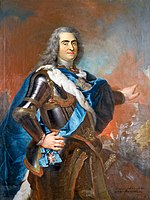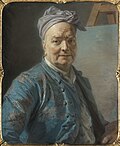Augustus II the Strong, Date of Birth, Place of Birth, Date of Death
TweetAugustus II the Strong
King of Poland, Grand Duke of Lithuania and Elector of SaxonyAbout Augustus II the Strong
- Augustus II the Strong (Polish: August II Mocny; German: August der Starke; Lithuanian: Augustas II; 12 May 1670 – 1 February 1733), also known in Saxony as Frederick Augustus I, was Elector of Saxony from 1697, Imperial Vicar and elected King of Poland and Grand Duke of Lithuania in the years 1697–1706 and from 1709 until his death in 1733.
- He was succeeded by his son, Augustus III of Poland.
- Augustus' great physical strength earned him the nicknames "the Strong", "the Saxon Hercules" and "Iron-Hand".
- He liked to show that he lived up to his name by breaking horseshoes with his bare hands and engaging in fox tossing by holding the end of his sling with just one finger while two of the strongest men in his court held the other end.
- He is also notable for fathering a very large number of children.
- In order to be elected King of the Polish–Lithuanian Commonwealth, Augustus converted to Roman Catholicism.
- As a Catholic, he received the Order of the Golden Fleece from the Holy Roman Emperor.
- As Elector of Saxony, he is perhaps best remembered as a patron of the arts and architecture.
- He established the Saxon capital of Dresden as a major cultural centre, attracting artists from across Europe to his court.
- Augustus also amassed an impressive art collection and built lavish baroque palaces in Dresden and Warsaw. His reigns brought Poland some troubled times.
- He led the Polish–Lithuanian Commonwealth in the Great Northern War, which allowed the Russian Empire to strengthen its influence in Europe, especially within Poland.
- His main pursuit was bolstering royal power in the Commonwealth, characterized by broad decentralization in comparison with other European monarchies.
- He tried to accomplish this goal using foreign powers and thus destabilized the state.
- Augustus ruled Poland with an interval; in 1704 the Swedes installed nobleman Stanislaw Leszczynski as king, who officially reigned from 1706 to 1709 and after Augustus' death in 1733 which sparked the War of the Polish Succession.
- He was buried in Poland's royal Wawel Cathedral in Kraków, but his heart rests in the Dresden Cathedral.
Read more at Wikipedia


 Date of Birth:
Date of Birth:  Place of Birth: Dresden, Saxony, Germany
Place of Birth: Dresden, Saxony, Germany
